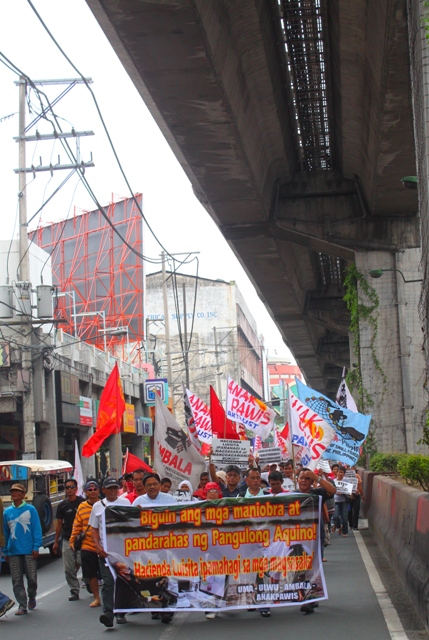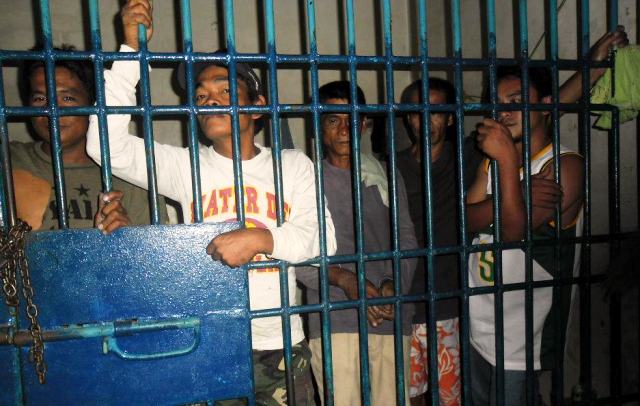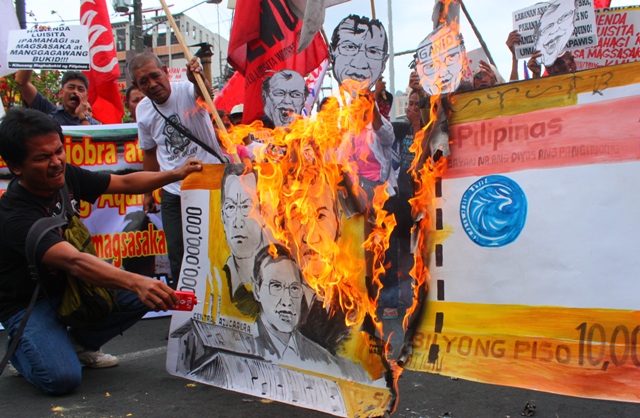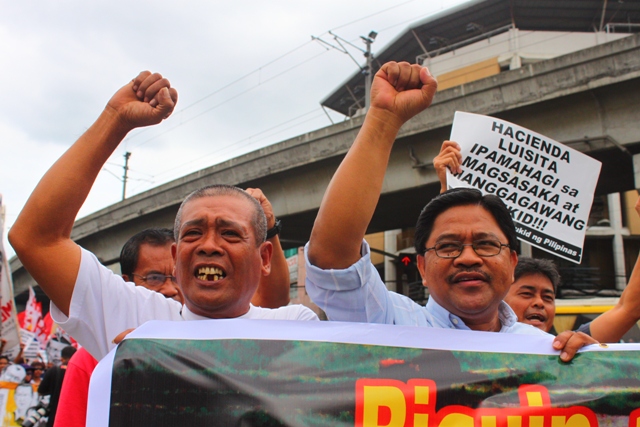“The Cojuangco-Aquino clan is the mastermind of this brutality as they see the camp-out at barangay Balete as symbol of the farmworkers’ unity in struggling for their rights to the land.” – AMGL
MANILA –For three consecutive days, security guards hired by the Rizal Commercial Banking Corporation (RCBC) have been attempting to put up fences at the 184-hectare land at Balete village in Hacienda Luisita.
The RCBC “acquired” the land on November 24, 2004 as payment for the loan obligations of Luisita Industrial Park Corporation (Lipco).
Since July last year, the farm workers led by the Alyansa ng Manggagawang Bukid sa Asyenda Luisita (Ambala or Alliance of Farmworkers of Hacienda Luisita), have occupied the land and cultivated it for their survival.
For three days, farm workers have been defending their camp, preventing RCBC security guards from putting up fences. At around 3 p.m. today, seven farm workers have been arrested by the local police.

Among those arrested are two village officials of barangay Balete – Winky Esteban and Jay Martinez–Dionisio Mandigma, Manuel Mandigma and Robert Mendoza, according to Alyansa ng Magbubukid sa Gitnang Luson (AMGL), the regional federation of farmers groups where Ambala belongs. They have been charged with malicious mischief and are now detained at the Philippine National Police (PNP)-Tarlac City.
Also arrested were Alfred Martinez, 17 and Meric Trinidad, 16 and were eventually released at around 4 p.m.
AMGL also reported that during the arrest, two policemen pointed their M-16 rifles at farm worker Becky Canlas while two other policemen manhandled Florida Sibayan, leader of the women of Ambala.
Leonor Saroza, Ambala secretary general, told Bulatlat.com that the land being claimed by the RCBC should be part of the thousands of hectares of land to be distributed to them.
On November 23, 2011, the Supreme Court issued a decision ordering the distribution of 4,916 hectares of land to farmworker beneficiaries. In the same decision, however, the high court excluded the land being claimed by the RCBC, stating that the bank was a “buyer in good faith.”
Ambala filed a petition before the Department of Agrarian Reform (DAR) seeking to revoke the conversion order the agency issued for the 500 hectares of land, including portions being claimed by the RCBC. In their petition, the farmworkers said the HLI did not comply with its obligations mandated under the conversion order. Specifically, it did not pursue the proposed development plan that was contained in the application for conversion and instead disposed of the 500 hectares to other Cojuango-owned companies and to RCBC.
 Five farm workers have been put behind bars for defending their camp-out in barangay Balete. (Photo courtesy of AMGL / bulatlat.com)
Five farm workers have been put behind bars for defending their camp-out in barangay Balete. (Photo courtesy of AMGL / bulatlat.com) Farm workers burn a fictitious P10-billion bill to illustrate their opposition to the ‘just compensation’ being demanded by the Cojuangco-Aquinos (Photo by Ronalyn V. Olea / bulatlat.com)
Farm workers burn a fictitious P10-billion bill to illustrate their opposition to the ‘just compensation’ being demanded by the Cojuangco-Aquinos (Photo by Ronalyn V. Olea / bulatlat.com)“The SC was shown photos of buildings and structures outside the land being claimed by the RCBC. In reality, the land remains agricultural. There are no buildings there, just eggplant, okra and other crops,” Sarzosa said in Filipino.
“The land should be returned to us,” Sarzosa said. Under the law, if the land has not been developed for other purposes and remains agricultural, it should be covered by agrarian reform.
“But what did the DAR do? Why did they not get back the land and distribute it to us? Since 2004, there has been no development on the land,” Sarzosa said.
Jobert Pahilga, lawyer of Ambala and executive director of Sentro para sa Tunay na Repormang Agraryo (Sentra), said the RCBC is still bound by the terms and conditions of the conversion order issued by DAR. “According to general banking laws, the RCBC must dispose of the land, which must be put under the coverage of agrarian reform,” he said.
Speaking at a rally at the foot of Chino Roces (formerly Mendiola) bridge this morning, Francine Dizon, Ambala spokesman, criticized the RCBC, saying: “The RCBC claims it did not know that the land is under dispute. How could that be when the whole world knows that a massacre happened?” Dizon said.
The transaction between Lipco and RCBC happened eight days after the massacre on November 16, 2004 that claimed the lives of seven farm workers.
Compelled to act on the petition of the Ambala, the DAR conducted an ocular inspection on the site on March 26.
Ambala said the DAR inspection is the reason why the RCBC is “desperate in putting up the fences.”
The RCBC filed grave coercion and occupation of private property against 22 farm workers, mostly leaders of Ambala. Last week, a local court issued a warrant of arrest against the farm workers.
In September, the RCBC also filed robbery charges against 17 other leaders and members of Ambala.
Collusion of landlords, capitalists
 Lito Bais (left), chairman of United Luisita Workers Union (Ulwu) and Anakpawis Rep. Rafael Mariano call for immediate distribution of land to farm workers.(Photo by Ronalyn V. Olea / bulatlat.com)
Lito Bais (left), chairman of United Luisita Workers Union (Ulwu) and Anakpawis Rep. Rafael Mariano call for immediate distribution of land to farm workers.(Photo by Ronalyn V. Olea / bulatlat.com)Speaking at the rally, Anakpawis Rep. Rafael Mariano slammed what he called as the “collusion of RCBC, Cojuangco-Aquinos and the Aquino administration.”
“They could not make us believe that Noynoy [Aquino’s nickname] has nothing to do with what is going on inside the hacienda,” Mariano said. “He spoke once, demanding ‘just compensation’ for his family,” he said.
“This only proves that until now, the Cojuangco-Aquinos would never give up the land,” Mariano said.
AMGL’s Canlas called on different sectors to support the farm workers’ struggle in Hacienda Luisita.
“If the presidential family could do such coercion at their very own backyard, worse is to happen to others in different parts of the region and country,” Canlas said.
Mariano said the Hacienda Luisita case is “a concrete expression of the class struggle between landlords and big capitalists on one hand and the farm workers and farmers on the other hand.”
“Aquino’s straight path is not the path toward genuine agrarian reform. We must persevere in our struggle,” Mariano told Hacienda Luisita farmers and supporters. ![]()

No comments:
Post a Comment